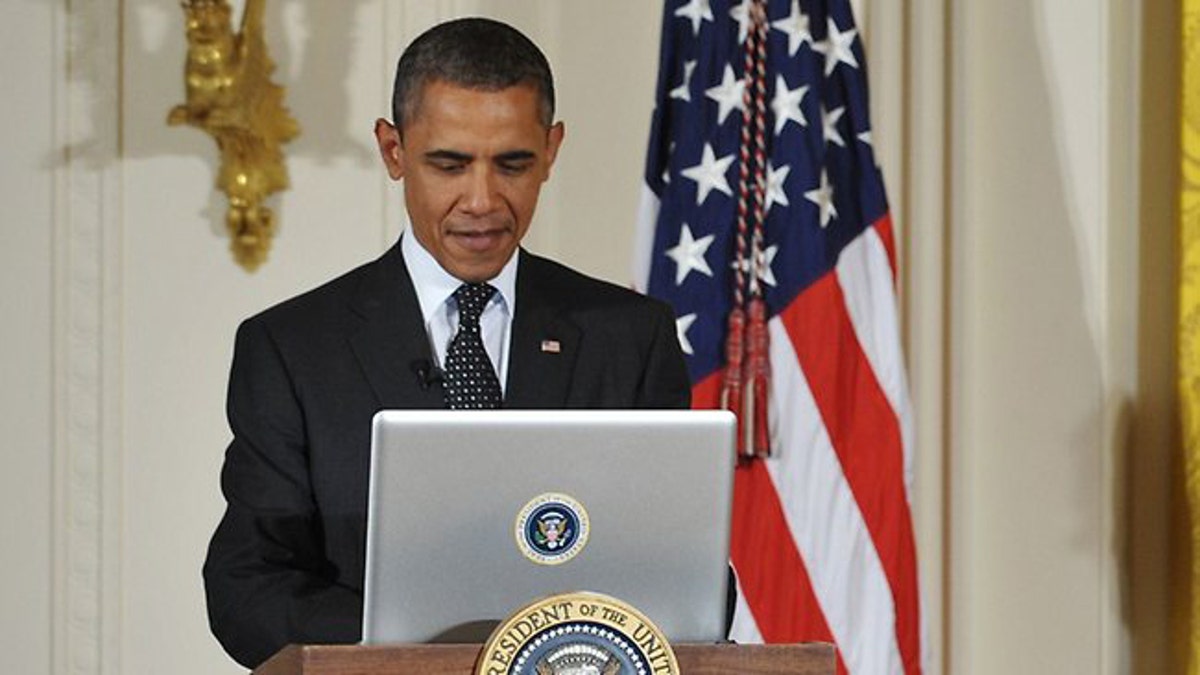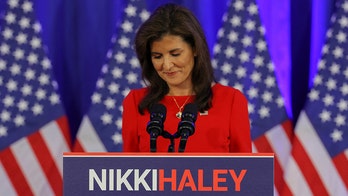
US President Barack Obama sends a Twitter message at the start of a "Twitter Town Hall" in the White House earlier this month. (AFP PHOTO/Mandel NGAN)
Howard Kurtz’s “Media Buzz” program debuts this Sunday at 11 a.m. EST.
Did you know that Twitter is to blame for breathless, superficial, snarky and generally lousy campaign coverage?
Not to mention anxiety, depression and the heartbreak of psoriasis?
In a deeply researched paper for Harvard’s Shorenstein Center, CNN correspondent Peter Hamby said many of the reporters and political pros he interviewed “were sharply critical of Twitter’s impact on Washington journalism, specifically the cynical tone of the online conversation and its preoccupation with insider gossip and process stories.”
Fair enough. Twitter can resemble the towel-snapping atmosphere of a locker room in which the in-crowd types are either sniping at each other or patting each other on the back.
Hamby did a terrific job. But he uses as his case study Mitt Romney’s campaign, in which officials and journalists were locked in a toxic environment.
Yet it was the Romney camp’s determination to keep their man away from the jackals of the press that poisoned the relationship, a situation that Twitter may have exacerbated but did not fundamentally cause.
In my view, Twitter has become shorthand for the crazy, noisy, rough, raunchy, speed-of-light, stuck-on-steroids nature of politics and journalism today. Was presidential coverage so much better in 2008, when Twitter was in its infancy? If the social network vanished tomorrow, would we suddenly be awash in serious and substantive reporting?
And even if we’re all tweeting way too much, no reporter interviewed could afford to opt out.
“Twitter is where that central conversation is taking place,” the study quoted Buzzfeed Editor-in-Chief Ben Smith as saying. “It’s not that Twitter is where you’re discussing the news. So much of it is actually happening on Twitter. It was just the central stream of the conversation for everyone.”
There is, of course, an incestuous downside. Liz Sidoti, the AP’s national politics editor, says Twitter has “created a groupthink, and the groupthink component of it is really kind of scary. It means we’re all reporting the same thing, and only half of it might be right. We are thinking the same way. It's become the new conventional wisdom setter, and that conventional wisdom gets amplified as well, because you have editors sitting in bureaus watching this stuff. When everything is in 140 characters, it gives a skewed version of reality.”
But a very closely followed version of reality, with Obama and Romney aides obsessively reading tweets and using the platform to spin the press.
“I could write a piece that was incredibly critical of either campaign and no one would care,” John Dickerson, the CBS political director and Slate columnist, told Hamby. “And say one snarky thing on Twitter and you get phone calls and outraged emails from both campaigns.”
What’s more, national newspapers are less important in a link economy in which everyone chases clicks.
“In today’s media age, Buzzfeed is just as important as the New York Times, and the price of doing business is cheaper,” said Mo Elleithee, who was recently named as DNC communications director. “All I need is the link. Matt Drudge taught us that. The Internet takes care of the rest.”
But again, Drudge and HuffPost were grabbing traffic with links long before Twitter and Buzzfeed existed.
One of Hamby’s key insights is how the network embeds—those twenty-something journalists who ride the buses and planes, report, shoot video and tweet—now drive much of the coverage.
He captures the resentment of campaign aides who find these embeds woefully inexperienced and too willing to fill Twitter with inconsequential silliness. (Of course, they might have posted more substance had the Romney campaign engaged them more.)
But why should news organizations spend tens of thousands of dollars to send their top correspondents on the road when they have little to no access to the candidates and wind up at canned events they could easily see on TV? No wonder they spend so much down time tweeting.
The positive impact (and Hamby gives this a nod) is that Twitter opens the dialogue to anyone who can build a following, not just MSM types, and it allows political junkies to follow the action on a second-by-second basis.
I’ll give the final word to veteran GOP strategist Mike Murphy.
“Now what happens is Twitter makes the campaigns a lot noisier, and the noise can eclipse the news," Murphy said. "And there is no incentive in Twitter journalism or any of this kind of 23-year-old embed journalism to have a filter, an editor, to separate the noise from the news. So the noise becomes the news.”




